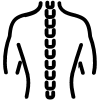Every year, we see new dietary trends emerge, some of which are more or less questionable from a physiological point of view. We hear all sorts of stories about so-called miracle diets, superfoods, and so on, with varying degrees of results.
Sport you ask?
Although essential for a healthy metabolic balance, physical activity does NOT cause weight loss. You might be surprised to learn that you'll likely lose more weight during a good night's sleep than during just two hours of physical activity.
But if everyone only talks to you about controlling your energy intake, in this article, we're going to talk about optimizing your expenditure!
So what is the REAL driver of weight loss?
Some scientific reminders... 🧪 ⚛️
In his Elementary Treatise on Chemistry, Antoine Lavoisier essentially proves that during chemical interactions between different bodies:
“Nothing is lost, nothing is created, everything is transformed.”
This will result in an elementary principle of modern physics: the principle of conservation of mass.
This discovery completely demystifies chemistry and constitutes one of the first demonstrations that it is possible to quantify matter precisely, atom by atom.
This concept will be very useful to us later on 🙂
Another story of oxygen and carbon
These elements constitute 65 and 18% of our weight respectively.
They interact together during a chemical reaction that is the basis of life: cellular respiration.
During this reaction, carbon is the element that is “burned.” It is directly or indirectly provided by food and nutrients (carbohydrates, proteins, lipids) which are the fuel of our cells.
Direct intake means that the carbon-carrying nutrient (e.g., glucose) circulates in the system following recent food intake.
Indirect intake is characterized by the intake of these nutrients following the metabolization of our “reserves.” They are scattered throughout and are mainly stored in our muscles and our beloved “fat” tissue.
Oxygen is the "burning" element. It is carried by the air we breathe. It is continuously present in our lungs where it is absorbed into the blood.

The elements resulting from this reaction are CO2 and heat.
If we apply Lavoisier's principle of conservation of mass, it is important to emphasize that the mass (and therefore the weight) of the system remains unchanged as long as the CO2 is not eliminated. Heat is only energy and has no mass of its own.
Respiration is essential both for the supply of oxygen needed for the reaction as well as for the elimination of CO2.
Breathing volume is the key to maintaining a stable weight and helping you lose weight.
Introduction to the concept of "Basal Metabolism"
Basal metabolism or resting metabolism corresponds to the body's "incompressible" energy needs, that is to say the minimum daily energy expenditure allowing the body to survive.
It represents a daily consumption of 1500 kCal, which is a significant energy expenditure! However, we know very well that if we spend energy, it is because we eliminate carbon somewhere! ;)
Maintaining basal (or resting) metabolism is therefore of capital importance in weight control
What factors influence this basal metabolism?
Age

We observe that this metabolism decreases inexorably in a manner almost proportional to the “aging” of the subject.
We can then highlight the relevance of compensating for the decrease in basal metabolism with age by increasing physical activity or reducing intake in order to guarantee a viable and healthy intake/expenditure balance.
Sedentary lifestyle
“The Caloric Twin Hypothesis”
Let's take the example of 2 homozygous twins (identical twins).
Each person is placed in a dummy room that does not allow any heat to escape. We could then measure the caloric energy emitted by each of the two subjects and thus deduce their energy expenditure.
Let's imagine that the 2 subjects are lying down for 24 hours:
We might then think that the energy expenditure of the two subjects would be strictly identical, but in practice this is what it looks like:

Basal metabolism is not an exact science and other, often intangible, factors come into play.
It can be concluded that over a given period, total energy expenditure related to basal metabolism tends towards the same value. On the other hand, instantaneous energy expenditure tends to vary.
Now suppose that subject 1 continues to respect this constraint for 1 month, but that subject 2 practices 5 hours of regular physical activity per week with a well-defined exercise routine in advance.
Defining the exercise sequence in advance and repeating the same one allows us to determine in advance the amount of energy expended specifically during the exercise. (Ex: 1 hour of cycling approximately 580 Kcal) And thus, impute them to the total energy expenditure in order to precisely calculate the amount of energy linked to the resting metabolism only.
Here is what the monthly averages of basal metabolism should look like for the 2 subjects over 6 months:

We should therefore observe two things:
- A sedentary lifestyle leads to a decrease in basal metabolism over the long term.
- Physical activity, even if practiced sporadically, helps maintain the basic metabolism at its nominal level, or even strengthen it.
How can we explain this development?
The answer lies in our favorite tissue: muscle.
By building muscle, which is a major energy consumer, you burn more calories, even at rest. This is why it's always advisable to build muscle when trying to lose weight, since muscle can help you burn extra energy in the long run.
On the contrary, restrictive diets lead to a loss of muscle mass, because it is used as an energy reserve, to the detriment of the basic metabolism... and here is how to create the perfect: Yo-Yo effect!
Conclusion
No miracles! Healthy and sustainable mechanisms are put in place over the long term.
The body is a “long-distance runner” and sudden changes in diet or the amount of physical activity you do are never a good idea.
Get advice from your coach or a nutritionist/dietitian, while keeping in mind that patience and time are your allies!
“You should never do something with the goal of losing weight, but rather ask yourself what you can do to help your body maintain its metabolism.”












